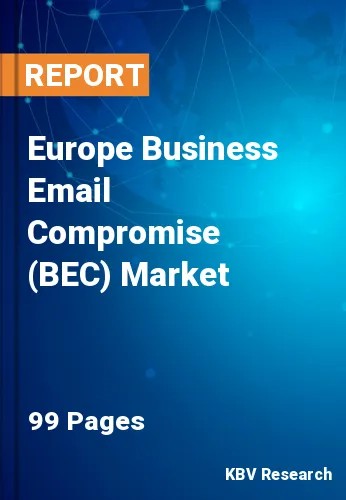The Europe Business Email Compromise (BEC) Market would witness market growth of 18.3% CAGR during the forecast period (2022-2028).
Attackers that utilize social engineering techniques such as business email breach pose as legitimate companies or people in order to get money, confidential information, or personal data for their own purposes. Because they are simple to launch in large numbers, have a high success rate, and are still incredibly effective, BEC attacks are presently the most common type of cybercrime. Business email compromises and phishing attacks are related and therefore can coincide, but they vary in that BEC attacks whether consequence in direct money transfers or credentials/other personal data being stolen, whereas phishing generally outcomes in compromised systems or credentials via malware or ransomware.
Attackers take the form of service or product providers and send bills with payment requests in this kind of assault. Attackers frequently pretend to be the company's current suppliers or vendors, taking advantage of the fact that there would likely be records of previous transfers and communications with the vendor as "evidence" of their identities. CEO fraud, which directly impersonates a corporation, is typically targeted at personnel, particularly those working in finance departments who are in charge of processing payments and those who routinely handle transfers. In this case, the attackers would then exert more pressure in an effort to make the victim feel pressed to fulfil the demands of a superior.
Russian intelligence claims that the government of Russia may be planning countermeasures against upcoming hacks. The Russian government not only disseminated malicious software, but also engaged in distributed denial-of-service (DDoS) attacks against Ukrainian government officials and infrastructure. A few cybercriminal organizations have also recently proclaimed their support for the Russian government.
These Russian-affiliated cyberterrorist organizations have pledged to carry out operations as payback for alleged assaults against the Russian government and people. Certain groups have also threatened cyberattacks against countries and organizations that aid the military of Ukraine. Several cybercriminal organizations have recently targeted Ukrainian websites in destabilizing ways, most likely in favor of Russia's military incursion.
The Germany market dominated the Europe Business Email Compromise (BEC) Market by Country in 2021, thereby, achieving a market value of $213.9 million by 2028. The UK market would showcase a CAGR of 17.3% during (2022 - 2028). Additionally, The France market is experiencing a CAGR of 19.2% during (2022 - 2028).
Based on Offering, the market is segmented into Solutions and Services. Based on Deployment Mode, the market is segmented into Cloud and On-premises. Based on Organization Size, the market is segmented into Large Enterprises and SMEs. Based on Vertical, the market is segmented into BFSI, IT & ITeS, Retail & eCommerce, Manufacturing, Government, Energy & Utilities, Healthcare and Others. Based on countries, the market is segmented into Germany, UK, France, Russia, Spain, Italy, and Rest of Europe.
Free Valuable Insights: The Global Business Email Compromise (BEC) Market is Predict to reach $3.3 Billion by 2028, at a CAGR of 19%
The market research report covers the analysis of key stake holders of the market. Key companies profiled in the report include Check Point Software Technologies Ltd., Broadcom, Inc., Fortinet, Inc., Cisco Systems, Inc., Trend Micro, Inc., Proofpoint, Inc., Mimecast Limited, Barracuda Networks, Inc. (Thoma Bravo), Agari (HelpSystems, LLC) and Zix Corporation.
By Offering
By Deployment Mode
By Organization Size
By Vertical
By Country
Our team of dedicated experts can provide you with attractive expansion opportunities for your business.

